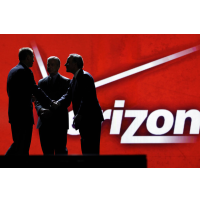Ominous Ruling by Federal Appeals Panels Overrules FCC and Threatens “Net Neutrality”
 (photo: Julie Jacobson, AP)
(photo: Julie Jacobson, AP)
The Federal Communications Commission (FCC) lost a major legal battle this week when Verizon successfully challenged portions of the government’s net neutrality rules aimed at forcing Internet providers like Verizon, AT&T, Comcast and Time Warner to allow access to all web sites at an equal speed.
The U.S. Court of Appeals for the District of Columbia Circuit ruled (pdf) 3-0 against the FCC and its 2010 rules to prevent Internet service providers (ISPs) from blocking online content or applications.
The ruling means ISPs can cut deals with large companies like Netflix or Amazon to offer “express lanes” on the Internet to stream video. The FCC opposes these arrangements, saying they would give big corporations an unfair advantage in doing business with consumers.
But the appeals court rejected the commission’s claim because the Internet is not considered a utility under federal law, which limits the kinds of regulations the FCC can impose.
Verizon and other broadband providers hailed the decision. They insisted ISPs have the right to manage their networks however they like, while also expressing support for an open Internet.
Consumer advocates said they were concerned over the ruling, saying it could lead to higher costs for customers, not to mention cripple net neutrality efforts.
“It leaves consumers at the mercy of a handful of cable and phone providers that can give preferential treatment to the content they profit from,” Delara Derakhshani, policy counsel for Consumers Union, told The New York Times.
That could lead to an increase in paid-access deals. “I would not be surprised if business development folks in I.S.P.’s around the country were now looking for ways to partner with content creators,” Public Knowledge acting co-president Michael Weinberg told the Times. The goal of those companies is “to make sure their unpartnered service is bad enough that a paid partnership is attractive.”
Craig Aaron, president and CEO of Free Press, an advocacy group, commented that, “Now, just as Verizon promised it would in court, the biggest broadband providers will race to turn the open and vibrant Web into something that looks like cable TV.”
The ruling did leave the FCC with some good news. It affirmed the commission’s authority “to promulgate rules governing broadband providers’ treatment of Internet traffic,” and it upheld agency rules requiring broadband companies to disclose how they manage their networks.
FCC Chairman Tom Wheeler said the agency is considering whether to appeal the ruling. He is also being urged to reclassify broadband Internet access as a telecommunications service rather than as an information service.
-Noel Brinkerhoff
To Learn More:
Rebuffing F.C.C. in ‘Net Neutrality’ Case, Court Allows Streaming Deals (by Edward Wyatt, New York Times)
The Internet As We Know It Is In Peril. The FCC Can (And Must) Save It (by John Nichols, The Nation)
Federal Court Guts Net Neutrality Rules (by David Kravets, Wired)
Verizon v. Federal Communications Commission (U.S. Court of Appeals, District of Columbia) (pdf)
Verizon Claims Right to “Edit” What You See on the Internet (by Noel Brinkerhoff, AllGov)
4 Political Concepts Ruined by Their Boring Names (by David Wallechinsky, AllGov)
- Top Stories
- Unusual News
- Where is the Money Going?
- Controversies
- U.S. and the World
- Appointments and Resignations
- Latest News
- Musk and Trump Fire Members of Congress
- Trump Calls for Violent Street Demonstrations Against Himself
- Trump Changes Name of Republican Party
- The 2024 Election By the Numbers
- Bashar al-Assad—The Fall of a Rabid AntiSemite






Comments